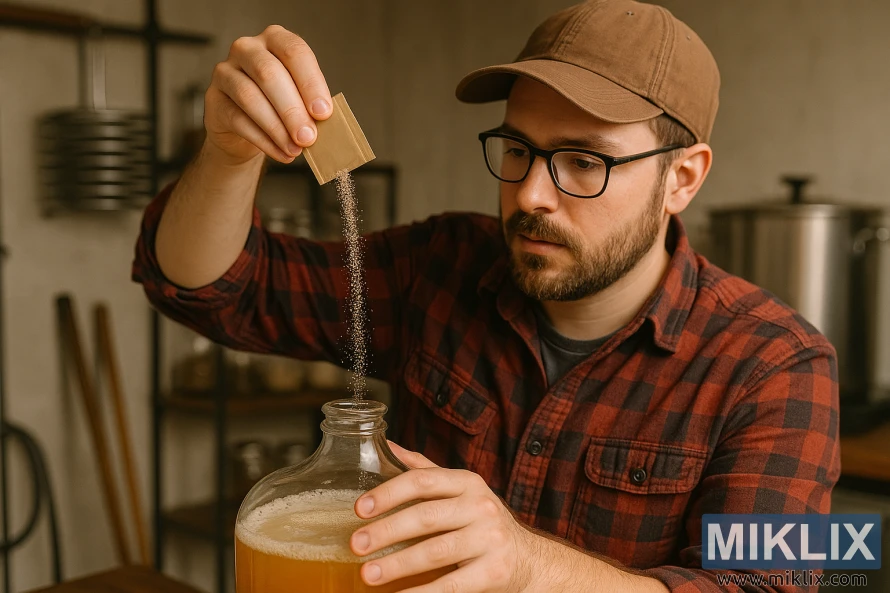Image: Homebrewer Pitching Yeast into Open Fermentation Vessel
Published: November 10, 2025 at 9:32:05 PM UTC
A focused homebrewer adds dry yeast to an open fermentation vessel in a rustic homebrewing environment, surrounded by brewing equipment and warm lighting.
Available versions of this image
Image description
In this detailed and lifelike image, a homebrewer is captured mid-action as he carefully sprinkles dry yeast into an open glass carboy filled with amber-colored wort, the unfermented liquid that will soon transform into beer. The scene takes place in a cozy, well-equipped homebrewing workshop that reflects both craftsmanship and dedication to the art of brewing. The brewer, a man in his 30s with a neatly trimmed beard and short brown hair, wears a brown baseball cap and a red-and-black plaid flannel shirt. His expression is one of concentration and precision, embodying the ritualistic care that defines homebrewing.
The glass carboy, a staple of small-batch fermentation, sits solidly on a wooden workbench that shows signs of use—minor scratches, stains, and a well-worn finish that testify to many previous brewing sessions. The carboy’s clear glass reveals the rich golden-brown hue of the wort, lightly frothy at the surface, catching the ambient light that filters softly into the room. The brewer’s left hand steadies the vessel by the neck, while his right hand holds a small foil packet tilted just above the opening, allowing a fine stream of yeast granules to cascade downward like tiny specks of dust illuminated by the warm, natural light.
Behind the brewer, the environment tells the story of a passionate hobbyist’s workspace. On the shelves in the background, various glass jars hold grains, hops, and brewing adjuncts neatly arranged and labeled. A stainless steel brewing kettle occupies part of the background, its metallic sheen reflecting faint glimmers of the room’s soft light. Coiled tubing and a wort chiller hang on the wall, hinting at the process that preceded this moment—boiling, cooling, sanitizing, and preparing the wort for fermentation. The muted beige walls, wooden shelves, and steel fixtures combine to create a warm yet utilitarian atmosphere, perfectly suited to the homebrewing aesthetic.
The lighting plays a central role in the image’s atmosphere. Natural light pours in from an unseen window, diffused to avoid harsh shadows, illuminating the fine grains of yeast as they descend into the vessel. The brewer’s skin tones are gently warmed by this light, emphasizing the care and human touch that distinguishes homebrewing from industrial-scale production. The combination of textures—smooth glass, rough wood, brushed metal, and soft fabric—adds a tactile realism that invites the viewer into the scene.
Every element in the image reinforces authenticity. The airlock and stopper, essential tools for fermentation, are seen resting off to the side, suggesting the next step in the brewing process: sealing the vessel to allow carbon dioxide to escape while keeping contaminants out. This small but accurate detail corrects a common visual mistake in brewing depictions—showing yeast being added while the airlock remains in place. Here, the sequence is correct and realistic, capturing the brewer’s knowledge and respect for proper technique.
The overall tone of the image is warm, intimate, and grounded in craftsmanship. It evokes the quiet satisfaction that comes from practicing a skill rooted in tradition and science. The viewer can almost sense the earthy aroma of malted barley and hops lingering in the air, mixed with the faint metallic scent of brewing equipment. Beyond mere documentation, this image celebrates the spirit of homebrewing—an act of creativity, patience, and personal expression. It reminds us that beer is not merely a beverage but the result of centuries-old methods carried out in kitchens, garages, and workshops like this one, where each batch reflects the brewer’s own hands, choices, and care.
The image is related to: Fermenting Beer with CellarScience Hornindal Yeast

